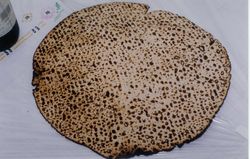CG7 & the “Lord’s Supper”

A Shmura Matzo (Unleavened Bread is Used for Passover)
This morning, I noticed the following as one of the three items that “flashed” at CG7-Denver’s home page:
Lord’s Supper
April 18, 2008
Unlike the two other flashing items, there was no button to click on for more information, so I thought that I would provide some myself.
Essentially because of earlier compromises (“it has a name that it is alive but it is dead”, Revelation 3:1), CG7 uses the term “Lord’s Supper” instead of Passover, even though Passover is the original and traditional term that the true church has referred to the time after sunset on the 14th of Nisan.
At least CG7 (unlike some groups) has the date correct as I presume that it means after sunset on April 18th (although it did not specify that).
But what is Passover? Is it a supper?
Notice what the Apostle Paul wrote:
20 Therefore when you come together in one place, it is not to eat the Lord’s Supper. 21 For in eating, each one takes his own supper ahead of others; and one is hungry and another is drunk. 22 What! Do you not have houses to eat and drink in? Or do you despise the church of God and shame those who have nothing? What shall I say to you? Shall I praise you in this? I do not praise you.
23 For I received from the Lord that which I also delivered to you: that the Lord Jesus on the same night in which He was betrayed took bread; 24 and when He had given thanks, He broke it and said, “Take, eat; this is My body which is broken for you; do this in remembrance of Me.” 25 In the same manner He also took the cup after supper, saying, “This cup is the new covenant in My blood. This do, as often as you drink it, in remembrance of Me.” 26 For as often as you eat this bread and drink this cup, you proclaim the Lord’s death till He comes (1 Corinthians 11:20-26).
Basically Paul is clearly teaching that this is NOT a supper, but a memorial of what occurred AFTER supper was completed. And he showed that we do this to proclaim the Lord’s death till He comes–which of course means that those who are properly keeping this believe that Jesus is coming back.
And there is no doubt that early Christians kept the Passover (and NOT Easter).
Apollinaris was a church leader of Hierapolis in Phrygia of Asia Minor. Around 180 A.D. he wrote:
The fourteenth day, the true Passover of the Lord; the great sacrifice, the Son of God instead of the lamb, who was bound, who bound the strong, and who was judged, though Judge of living and dead, and who was delivered into the hands of sinners to be crucified, who was lifted up on the horns of the unicorn, and who was pierced in His holy side, who poured forth from His side the two purifying elements, water and blood, word and spirit, and who was buried on the day of the passover, the stone being placed upon the tomb (Apollinaris. From the Book Concerning Passover. Translated by Alexander Roberts and James Donaldson. Excerpted from Volume I of The Ante-Nicene Fathers. Alexander Roberts and James Donaldson, editors; American Edition copyright © 1885. Copyright © 2001 Peter Kirby).
Some articles of related interest may include:
Passover and the Early Church Did the early Christians observe Passover? What did Jesus and Paul teach? Why did Jesus die for our sins?
Melito’s Homily on the Passover This is one of the earliest Christian writings about the Passover. This also includes what Apollinaris wrote on the Passover as well.
Should Christians Keep the Days of Unleavened Bread? Do they have any use or meaning now? This article supplies some biblical answers.
Is There “An Annual Worship Calendar” In the Bible? This paper provides a biblical and historical critique of several articles, including one by WCG which states that this should be a local decision. What do the Holy Days mean? Also you can click here for the calendar of Holy Days.
What Happened in the Crucifixion Week? How long are three days and three nights? Did Jesus die on “Good Friday”? Was the resurrection on Sunday? Do you really know? Who determined the date of Easter?
Did Early Christians Celebrate Easter? If not, when did this happen? What do scholars and the Bible reveal?
Church of God, Seventh Day: History and Teachings Nearly all COG’s I am aware of trace their history through this group. Whaid Rose is the president of the largest CG7 group (Denver). Do you know much about them?
The Sardis Church Era was predominant circa 1600 A.D. to circa 1933 A.D. Discusses early history of the Seventh Day Baptists, Seventh-day Adventists, and COG-7th Day.
 |
Tweet |
|